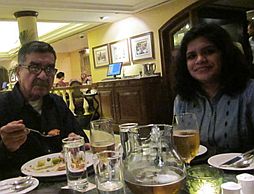
Jatinder Sethi, shown with his granddaughter Abha, was born in Lyallpur, now Faislabad, in pre-Independence India. He finished his M.A. (English) from Delhi University in 1956, and went off to London to study Advertising in 1958. He passed his Membership Exam of The Institute of Practitioners in Advertising (M.I.P.A) in1965, and joined Rallis India in Bombay. Later, for over 20 years, he worked for the advertising agency Ogilvy &\; Mather. Now retired, he helps his son in his ad agency in Delhi.

Author's note: On November 8, 2015, with the grace of God, I celebrated my 85th birthday with my immediate family, at our favourite restaurant -"Delhi O Delhi" at the India Habitat Centre, Lodhi Road, Delhi. Abha, my granddaughter, now 23, joined the family celebration. She takes a very keen interest in her grandparents. She had read, and commented on all my earlier stories about my personal and professional life. Since I had not written anything new for quite some time, she asked me why. My answer was that I had no more memories left to tell her. "Dadda, think, there must be some other childhood memories that you could tell us. Please, take your time, think, and write, no matter how short, long or uninteresting, I want to know about it. PLEASE!"That's what motivated me to write this story.
November 8 1930! "Kaka Is Born".